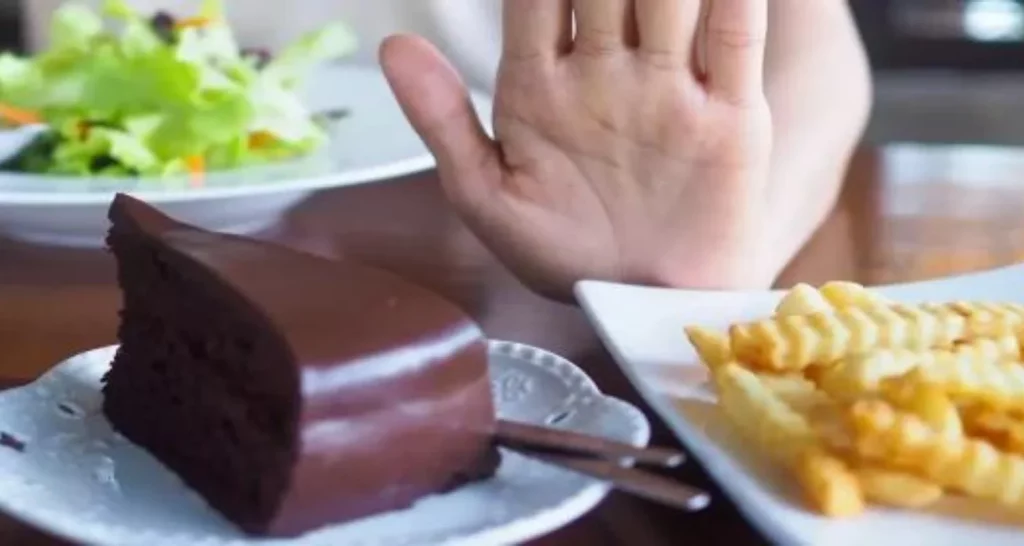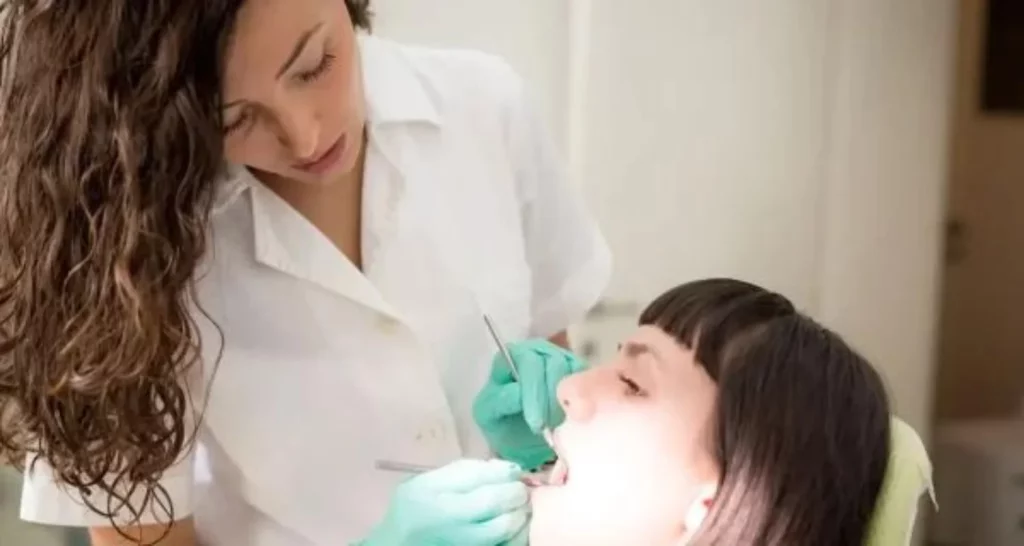Last Updated on: 9th December 2025, 10:18 am
To care for your teeth on Valentine’s Day, limit sugary treats, drink water after sweets, brush and floss thoroughly, and choose teeth-friendly gifts like dark chocolate or sugar-free gum.
Valentine’s Day is marked on the calendar by lovers, but it is also a day on which the consumption of sweets can skyrocket, putting the dental health of adults and children to the test. The key to enjoying this holiday without compromising our oral health lies in adopting certain responsible strategies and habits.

Why Is It Important to Take Care of Your Teeth on Valentine’s Day?
With the arrival of Valentine’s Day, it is common to feel the desire for something sweet or to face a dilemma about what type of candy to choose for your child to take to school.
Valentine’s Day, with its abundance of chocolates, candies, and other treats, can be a challenge for our dental health. The sugar present in these sweets is the main food for oral bacteria, which transform it into acid, eroding tooth enamel and contributing to the appearance of cavities. It is crucial to moderate the consumption of these products and follow a strict oral hygiene routine.
How Sugar Affects Dental Health?

The vast majority of sweets contain sugar, which can cause serious deterioration in dental health. Candy hearts, cherry-flavored lollipops, and chewy gums are delicious ways to celebrate Valentine’s Day. However, these sweet pleasures come with a high cost, as excess sugar can trigger significant problems with oral health.
Sugar acts as a hidden enemy for the health of our teeth. Excessive intake can rapidly promote dental deterioration, favoring the development of cavities and gum disease. Sugar is also capable of modifying oral pH, creating an ideal environment for the growth of harmful bacteria.
The problem is due to a slimy layer of natural bacteria, known as plaque, that constantly forms on the teeth and gums. When these bacteria come into contact with the sugar present in the mouth, they transform it into a harmful acid that attacks the teeth. Repeated attacks weaken tooth enamel, eventually leading to the formation of cavities.
Sticky sweets, such as chewy candies, are especially harmful. These treats stick to the teeth and cover them with a layer of sugar, increasing the risk of cavities. On the other hand, hard candies, such as peppermints and lollipops, dissolve slowly in the mouth and, if bitten forcefully, can damage teeth or dental restorations. Thus, it is advisable to consume them with caution.
What Are the Best Strategies to Enjoy Sweets Without Harming Your Teeth?

To enjoy sweets without putting your dental health at risk, it is advisable to opt for those that are less harmful to your teeth, such as dark chocolates, which contain less sugar and may have antioxidant benefits. It’s also important to limit sweets to specific times of the day, preferably after meals, to minimize sugar exposure.
1. Choice of tooth-friendly sweets
Not all sweets have the same impact on our dental health. For example, hard or sticky candies can stick to teeth and make them difficult to clean, while dark chocolates and sugar-free candies are friendlier options.
2. Limit sugar consumption
An effective strategy to protect our teeth is to limit the amount of sugar we consume. This does not mean giving up sweet pleasures completely, but rather being aware of the amount and frequency of consumption. Complementing the consumption of sweets with adequate oral hygiene is also essential.
3. Effective dental hygiene routines
A good dental hygiene routine is essential to combat the negative effects of sugar consumption.
This includes brushing your teeth at least twice a day with fluoride toothpaste, flossing daily, and rinsing with an antibacterial mouthwash to remove food debris and plaque that brushing alone can’t reach.
4. Water consumption is the key to adequate hydration
Staying hydrated is essential during any celebration. Sugary drinks and alcohol can trigger dry mouth, increasing the risk of developing cavities. Frequent water consumption helps keep the mouth well hydrated, neutralizing the adverse effects of these drinks. The act of drinking water offers multiple benefits, acting as the healthiest ally for the well-being of your oral cavity and therefore your smile:
a. Water acts as a cleaning agent, facilitating the removal of food residue from the teeth while providing a feeling of freshness to the mouth.
b. It stimulates saliva production, an essential process to lubricate the gums and prevent the accumulation of bacteria in gingival tissues. This effect also contributes to strengthening the teeth.
c. It balances the pH of the oral cavity, keeping it neutral and, therefore, reducing the risk of acidity. As a result, water helps prevent the formation of cavities and periodontal diseases.
d. It promotes the healing of small ulcers or wounds in the mouth. It can prevent their appearance, which tends to occur more frequently in a of dry mouth.
5. Proper brushing techniques
Brushing your teeth correctly is crucial to effectively remove dental plaque and food debris. It is recommended to use a gentle, circular brushing technique, paying special attention to hard-to-reach areas.
6. The role of dental floss and mouthwash

Dental floss is an essential ally in the fight against dental plaque and periodontal diseases. Its daily use, complemented with mouthwash, can mean the difference between a healthy mouth and the development of dental problems.
7. Healthy alternatives to traditional sweets
Numerous healthy and delicious options can satisfy anyone’s sweet tooth without compromising their dental health. Fresh fruits, whole grain snacks, and low-sugar homemade candy are excellent alternatives.
8. Healthy snack options
Snacks like apple wedges with almond butter, fresh berries, or whole grain bars can be tasty and nutritious alternatives to traditional sweets, offering dental and overall health benefits.
9. Low sugar sweet recipes
Preparing sweets at home using natural sugar substitutes such as natural honey, brown sugar, stevia or erythritol is an excellent way to control the amount of sugar we consume while enjoying delicious desserts that are less harmful to our teeth.
How Can Parents Teach Kids to Enjoy Life Without Relying on Sugar?

It is essential to educate children about the consequences sugar has on oral health and promote healthy practices from an early age to ensure future dental well-being. Including them in making healthy snacks and creating dental cleaning routines that are both fun and effective will have a notable impact.
It is crucial to talk to children about how excess sugar can damage their teeth and affect their overall health. Through education and setting an example, parents play a vital role in forming healthy eating and oral hygiene habits.
Promoting activities that do not revolve around the consumption of sweets, such as playing outdoors, and doing crafts or reading, helps break the link between entertainment and sugar consumption, thus promoting a healthier way of life.
Why Are Regular Dentist Visits Important for Prevention and Oral Health?

Going to the dentist regularly is key to ensuring oral health. These specialists are not only trained to identify and resolve problems from their initial stages, but they also provide tailored recommendations for optimal tooth and gum care.
Regular dental check-ups facilitate the detection and timely treatment of conditions such as cavities, periodontal diseases, and other oral disorders, thus preventing future complications that require more invasive and costly interventions.
In addition, dentists have an arsenal of preventive treatments at their disposal, including deep dental cleanings, fluoride treatments, and the placement of sealants, all aimed at strengthening teeth against cavities and possible oral pathologies.
Conclusion
Enjoying a sweet-filled Valentine’s Day doesn’t have to compromise our dental health, as long as we adopt responsible habits and maintain a rigorous oral hygiene routine. By making smart choices about the types of sweets we consume, limiting our exposure to sugar, and following our dentists’ recommendations, we can ensure to keep our smiles as sweet and healthy as the love we celebrate on this special day.
Frequently Asked Questions
What is the opinion of dentists about sweets?
Excess sugar is a direct cause of tooth decay. Sugar, whether in drinks or sugary solid foods, is equally harmful. Soft drinks, energy drinks and juices have high levels of acidity. Likewise, foods that contain starch and sugar, such as lollipops, candies, and mints, are contributing factors to the development of cavities.
How do sweets affect dental health?
When sugar is consumed, it interacts with the bacteria present in dental plaque to produce acid. This acid is responsible for tooth decay since it slowly dissolves the enamel, creating holes or cavities in the teeth. Decay can lead to tooth abscesses, which could result in the need to extract the tooth.
How to prepare treats that do not harm teeth?
Opt for sweets that don’t stick to your teeth.
Instead of eating sticky foods that get stuck between your teeth, choose those that dissolve quickly, thus minimizing contact with the enamel. For example, replace candy and sugar canes with dark chocolate.
How to take care of your teeth after consuming sweets?
Tips to preserve dental health against the negative impact of sugar.
1. Reduce the consumption of snacks. Every time you eat something, the pH in your mouth drops…
2. Select healthier treats…
3. Eat sweets along with other foods…
4. Rinse your mouth after eating something sweet…
5. Wait 30 minutes before brushing your teeth after eating…
6. Chew sugar-free gum…
7. Maintain frequent and adequate dental hygiene.
Voice and Search (Q&A)
What are the best Valentine’s Day gifts for healthy teeth?
Dentists recommend sugar-free gum, dark chocolate in moderation, or non-edible gifts like flowers or love notes as tooth-friendly Valentine’s gifts.
Can I enjoy Valentine’s candy without damaging my teeth?
Yes! Enjoy sweets with meals, drink water after, and brush your teeth 30 minutes later to reduce sugar's effect on enamel.
Are there dental tips for kids on Valentine’s Day?
Absolutely. Limit sticky candies, encourage brushing after treats, and offer fun alternatives like fruit skewers or sugar-free snacks.
Share:
References
1. American Dental Association (ADA). (Aug, 2023). Nutrition and Oral Health. https://www.ada.org/resources/research/science-and-research-institute/oral-health-topics/nutrition-and-oral-health
2. Skafida, V., & Chambers, S. (2018). Positive association between sugar consumption and dental decay prevalence independent of oral hygiene in preschoolpre-school children: a longitudinal prospective study. Journal of public health (Oxford, England), 40(3), e275–e283. https://doi.org/10.1093/pubmed/fdx184
3. Tungare S, Paranjpe AG. (Jul, 2023). Diet and Nutrition to Prevent Dental Problems. StatPearls. https://www.ncbi.nlm.nih.gov/books/NBK534248/
4. College of Dentistry. (Feb, 2023).How to Take Care of Your Dental Health This Valentine’s Day. University of Illinois Chicago. https://dentistry.uic.edu/news-stories/how-to-take-care-of-your-dental-health-this-valentines-day/
- Nayibe Cubillos M. [Author]
Pharmaceutical Chemestry |Pharmaceutical Process Management | Pharmaceutical Care | Pharmaceutical Services Audit | Pharmaceutical Services Process Consulting | Content Project Manager | SEO Knowledge | Content Writer | Leadership | Scrum Master
View all posts
A healthcare writer with a solid background in pharmaceutical chemistry and a thorough understanding of Colombian regulatory processes and comprehensive sector management, she has significant experience coordinating and leading multidisciplina...Recent Posts















